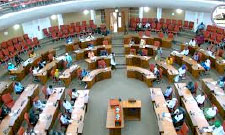
The proposed bill, tabled on Monday, aims to establish legislative authority for addressing population and development-related concerns in the nation, safeguarding the rights of all individuals, guiding the implementation of population programs, and ensuring dedicated funding for population-related matters, with a focus on inclusivity.
Additionally, the Bill contains provisions for the continuation of the National Population Secretariat and the establishment of the National Observatory for the Demographic Dividend, aiming to tackle population-related issues and ensure that demographic considerations are integrated into various facets of national development in The Gambia.
Deputies also raised concerns about the government's commitment to ensuring the commission has the autonomy to fully carry out its functions without interference since there have been allegations of interference with their work and lack of transparency.
They stated there are concerns about duplication of efforts, with some development partners dictating to the secretariat what to do.
Vice President Momodou Jallow has said“the allegation of interference is not the case”, as the secretariat is under the commission of the vice president.
He said both the secretariat and the commission exist, with the commission providing policy guidance and the secretariat handling day-to-day implementation. Also, a new board has been created to work with the secretariat daily, to improve effectiveness.
VP Jallow emphasised the significance of data and its role in creating an effective budget. He also stressed the importance of establishing a demographic dividend observatory to monitor and leverage the youthful population, with support from partners.
The VP further underscored the importance of transparency in disclosure. "I recommend that all board members, not just this one, declare any conflict of interest. If a board member's company does business with the board they serve on, they should openly disclose this and refrain from participating in related discussions. This transparency is necessary to prevent accusations of corruption. I believe these recommendations should apply to all boards, not just this one."
In a similar vein, the Early Warning Bill was also sent to the Business Committee for further committal. The bill aims to enhance the government's capacity to predict and respond to a wide range of events, from violent conflicts to humanitarian crises, through a centralised agency. It also emphasises the government's commitment to ensuring human security and establishing effective early warning mechanisms.
Read Other Articles In Headlines

CJ launches commissioners of oaths association, swears in new notaries public
Jan 26, 2024, 11:35 AM

Gambia receives US$60M to boost sustainable growth, climate resilience
Nov 22, 2023, 11:19 AM



